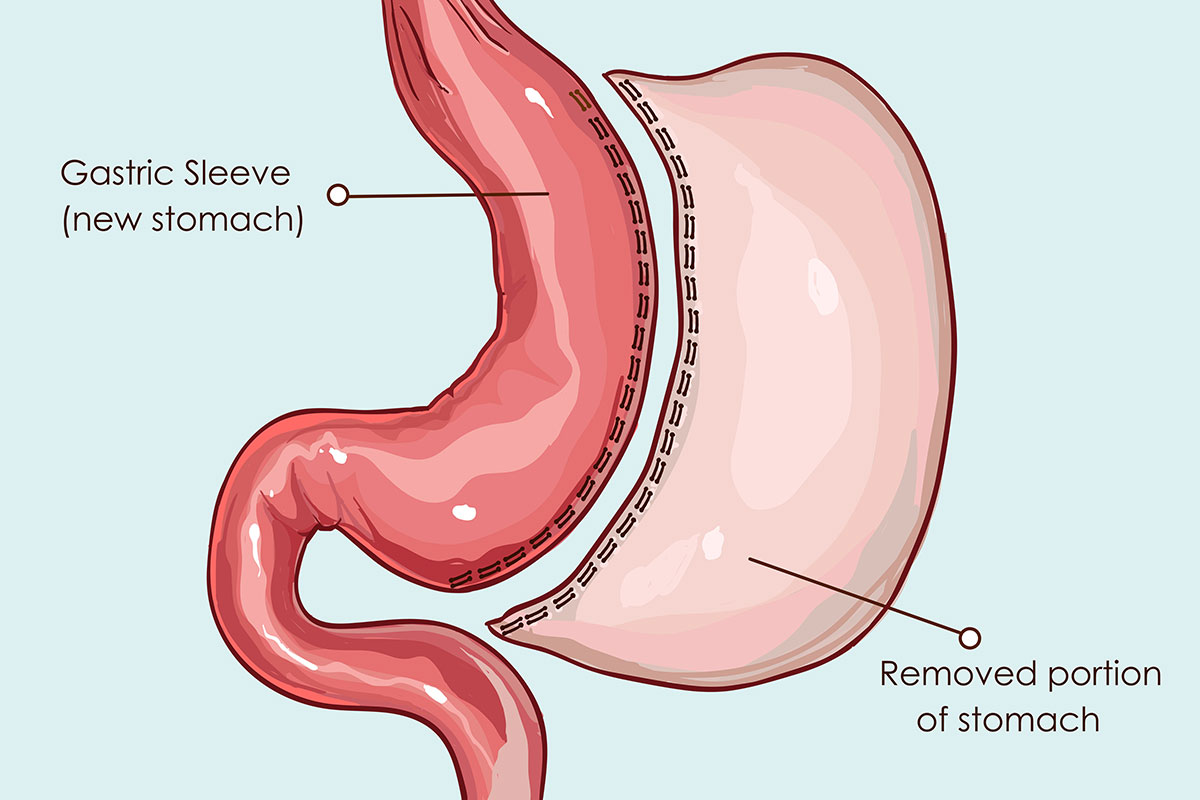
As a bariatric surgeon, I see a large number of people who are in need of significant weight loss and improvement in their personal health. It’s a common occurrence to have patients at my office request a sleeve gastrectomy—in fact, it’s about 70% of my current surgical volume.
At my initial consultation with a patient requesting a sleeve, I try to answer two important questions:
- What happens during a sleeve gastrectomy?
- Is a sleeve gastrectomy an appropriate procedure for me?
Since the second question is personal (based on individual health history, current medical problems, long-term goals, and insurance status), those are considerations for another day. The first question, however, I’ll tackle in this article.
What is a Sleeve Gastrectomy?
A sleeve gastrectomy is a weight loss procedure that involves the removal of 60% to 70% of the stomach. It is done to assist a patient with weight loss and to resolve certain obesity-related medical problems.
A sleeve gastrectomy is considered to be both a restrictive and a hormonal procedure.
- It is restrictive because it limits the amount of food that can be consumed at a time. The new stomach can hold a much smaller volume than before, which leads to a quicker sense of satiety.
- It is hormonal because it changes the gastrointestinal (GI) hormones so that the body processes the food differently and responds to the intake in a healthier way.
What Are the Benefits of a Sleeve Gastrectomy?
Sleeve gastrectomy patients typically lose a substantial amount of weight. Your surgeon can give you an idea of what a reasonable weight loss goal looks like.
Sleeve gastrectomy can also improve many obesity-related medical problems. For example, it is not unusual for diabetes, sleep apnea, high cholesterol, and hypertension to be significantly improved or even cured.
In general, sleeve gastrectomy patients can expect to have a higher quality of life. If your weight has been preventing you from doing things you enjoy or participating fully in your life, a sleeve gastrectomy can help you gain some—or all—of that function back.
Read more about the benefits of a sleeve gastrectomy here.
What Happens During a Sleeve Gastrectomy?
A sleeve gastrectomy is performed laparoscopically, which means it is done using several small incisions rather than one large one. The stomach is reshaped from a big bag-like organ to a shape that resembles a banana or a sleeve (hence the name). There are no foreign bodies associated with the procedure itself.
The procedure is performed under general anesthesia and typically takes an experienced surgeon about 30 minutes. The patient usually goes home the next day.
How Long Does it Take to Recover from a Sleeve Gastrectomy?
The patient can usually return to work in 1 to 2 weeks after a sleeve gastrectomy, although very vigorous jobs may require a longer recovery period as there are lifting restrictions for the month after surgery. For 6 to 8 weeks after the surgery, the diet is advanced from clear, thin liquids to an appropriate long-term diet.
Who Can Get a Sleeve Gastrectomy?
The sleeve gastrectomy is typically recommended for individuals with a body mass index (BMI) of 40 or higher. It is also recommended for patients with a BMI of 35 or higher if they have at least one obesity-related medical problem, such as type 2 diabetes or sleep apnea. In certain situations, the sleeve is even used for people with a BMI closer to 30.
What Are the Risks of a Sleeve Gastrectomy?
Because a sleeve gastrectomy is a surgical procedure, complications are possible. You should consult with your surgeon about the possibility of complications in your specific situation.
You should also be aware that sleeve gastrectomy is not a “quick fix.” You must commit to a healthy diet, an exercise regimen, and ongoing monitoring for the rest of your life.
Where Should I Get a Sleeve Gastrectomy?
Finding the right surgeon and the right facility can be challenging. You can talk to your primary care physician (PCP) to get a referral. Other people in the healthcare field may also be able to give a good recommendation.
In general, you want to find a very experienced surgeon at a high-volume center. The goal is to find a place where your surgery will be performed by an expert and you will be monitored by a highly experienced team.
Is a Sleeve Gastrectomy Right for Me?
If you are considering a sleeve gastrectomy, discuss the benefits and risks with your PCP. While the sleeve can help you lose weight by limiting how much you eat and changing your GI hormones, there is a risk for surgical complications and a requirement for a lifelong commitment to better health practices.
If you and your doctor decide that a sleeve gastrectomy is right for you, I encourage you to request an appointment at Arkansas Heart Hospital’s Bariatric & Metabolic Institute by calling (501) 219-7770. We would love to help you on your journey to better health.
